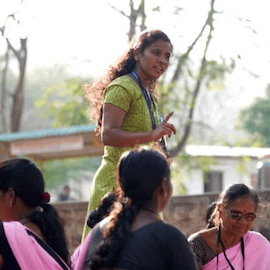Rani, a 29-year-old mother of two, lives with her family of four in a cramped 100-square foot room in Manesar, in the northern Indian state of Haryana. “The room is small but has everything we need,” she says.
Rani dropped out of school when she was 13 and is now a full-time homemaker. Her husband works as a daily wage labourer at the tyre manufacturing shop near their home. Their living situation is common among families in this industrial town, where the average household income is around $150 per month, and people live in clustered neighbourhoods with a community bathroom.
But despite having limited education and resources, parents in this community are determined to change their families’ fates by investing in their children’s education. And they’re increasingly leveraging tech-based solutions to help maximise the impact of that investment. That’s why, when it was time for Tanu, Rani’s daughter, to enrol in the nearby Anganwadi centre (a free childcare facility run by the Indian government), Rani used her savings to buy a smartphone.
This linkage between traditional classroom teaching and online, tech-fueled educational resources promises to transform early childhood education in India, offering new tools to both parents and educators. In this article we explore the impact of this approach.
Using Technology as a Catalyst for Early Childhood Education in India’s Underserved Communities
India has a population of over 1.4 billion people and is home to 20% of the world’s children. However, a dark reality faces the country: Around 37 million children lack access to any form of early education service, regardless of public or private options, putting their developmental growth at risk. While the Indian government has made several efforts in the last decade to universalise early childhood education, tremendous technological interventions will be needed to reach the scale required to achieve the United Nations’ Sustainable Development Goal 4.2 of providing equal access to quality pre-primary education to all.
Fortunately, social entrepreneurs and other innovators in India are creating the sort of solutions that can enable this scale. To take one example, Rocket Learning, a non-profit founded in 2020, has built a low-tech solution that leverages WhatsApp, a free messaging and social media app used by over 700 million people in the country to help bridge India’s public-private education gap. The Rocket Learning platform does this by dispatching high-quality, play-based educational content to all parents and children enrolled in Anganwadis in states that have partnered with the organisation, with the aim of transforming these daycare centres into vibrant learning hubs. Established in 1975 as part of the Integrated Child Development Services program, Anganwadi centres are crucial hubs for providing daycare and other essential services to children and their mothers in underserved neighbourhoods.
Our goal with Rocket Learning is to ensure that no child is left behind, regardless of their geographic location or their family’s economic status. To that end, every Anganwadi in the states we partner with gains automatic access to our platform, bringing our educational content to countless families that previously had no access to preschool education. Furthering this access, each video, audio or digital worksheet that we share with users via WhatsApp has a file size of less than 5MB, so this material doesn’t consume much data — an important consideration for people who cannot afford unlimited data plans.
How Rocket Learning Supports India’s Anganwadi Workers
Rocket Learning’s platform isn’t just for parents and kids — it also helps Anganwadi staff (an all-women cadre of workers who are responsible for running these daycare centres) by automating tasks like lesson planning and assignment grading. Our advanced AI and machine learning system recognises parents’ and children’s efforts with incentives such as social campaigns, leaderboards, customised video collages and celebratory messages in WhatsApp groups. This technology helps Anganwadi workers motivate children more effectively. And our AI bot responds to parents’ messages about their children’s activities, so the workers don’t have to. This ensures that parents receive the acknowledgment they need to keep encouraging their children’s learning.
Moreover, we have also partnered with the Ministry of Women and Child Development and the National Institute of Public Cooperation and Child Development to train Anganwadi workers through a three-day, in-person training workshop, providing them with the guidance they need to become better equipped as educators. Ultimately, our efforts help both these workers’ supervisors and the parents of their students to recognise them as caregivers and valued educators, providing crucial social validation.
This support is vital in India, given the important role of Anganwadi workers in the country’s early childhood development landscape — and the magnitude of the tasks they perform. An Anganwadi worker takes on multifaceted responsibilities within these centres, caring for women and children, educating the community, and collecting vital health and nutrition data. With official government data indicating that over 1.37 million Anganwadi centres are operating in India, each worker is assigned to approximately 250 homes, forming an unparalleled connection with the community.
Despite facing numerous challenges, such as overpopulation, unfavourable worker-pupil ratios and inadequate infrastructure, Anganwadi workers go above and beyond to support their charges. They act as the linchpin for early education, nutrition and health in rural areas, providing a foundation for holistic development that some children may never receive otherwise.
Rocket Learning’s support lightens their cognitive load and equips them to cater to the diverse needs of their students. To that end, Anganwadi workers receive daily bite-sized training videos that we create, based on the National Curriculum Framework that they are mandated to follow. Our efforts ensure continuous learning, allowing these workers to obtain flexible and accessible education. Meanwhile, the interactive elements of our model promote accountability and foster communities of practice, as these daycare workers conduct activities and respond to queries from peers on the peer-working groups in the WhatsApp chat.
Supplementing Anganwadis’ Efforts by Promoting Learning at Home
Coupled with the four hours of play-based, high-quality education that Tanu now gets at her Anganwadi, Rocket Learning’s platform enables her family to enhance and supplement that learning at home. Her mother, Rani, and occasionally her father, dedicate approximately half an hour each day to working with Tanu to complete learning activities sent on the Rocket Learning WhatsApp group.
These activities encompass literacy, numeracy, physical education, identifying colours and shapes, etc. Parents engage by having their children answer digital worksheets and complete the required activities, and share audio recordings or videos of their children completing these activities on community WhatsApp groups as mandated in our program.
This approach helps keep both kids and their parents engaged. “My daughter completes all the worksheets on time because she’s always so excited. We get to see the results almost instantly after we send the answers in,” Rani says.
Beyond Rani and her community, Rocket Learning’s educational content reaches 2.5 million children across nine states in India, which are home to 25% of the country’s population.
Leveraging Artificial Intelligence to Boost Student Performance
To enhance retention and engagement amongst parents, the AI-bot-based, real-time feedback loop mentioned above acknowledges and recognises parents (users) when they send a completed activity, making them feel seen and motivated. The platform’s AI algorithms facilitate instant analysis of student responses, coupled with automatic worksheet grading. Our ambitious goal of assessing over 10 million worksheets and multimedia interactions by 2025 underscores our dedication to scaling our impact.
We’ve also used AI to address another formidable barrier to learning in a linguistically diverse country like India: language translation. Thanks to Rocket Learning’s AI-powered translation, students across different states and regions can now learn in the languages they are most comfortable with. We recently obtained support that will help us build upon these services, as we received a $1.5 million grant from Google.org, one of the world’s leading technological platforms, last year. This partnership will support our plans to enhance our generative AI capabilities, enabling us to create over 500 animated content stories and rhymes with high density and personalisation in five languages.
This personalisation is a key benefit of our use of AI, as the technology allows Rocket Learning to create learning journeys catered to each child — something we’re aiming to leverage to impact a cohort of 3 million students by 2025. This transformative approach tailors students’ educational experiences to their individual learning paces, styles and needs, breaking the traditional one-size-fits-all model.
But despite these promising strides, the path to AI-driven educational transformation is challenging. In integrating these technologies into our platform, Rocket Learning faces the multifaceted task of navigating infrastructural limitations, users’ varying levels of digital literacy, and the scepticism toward technology that’s common in low-income communities. Our biggest challenge, however, is convincing parents of the importance of early learning — and of the need for their ongoing involvement in their children’s educational journeys.
Using Behavior Change to Enhance Parents’ Role in their Children’s Education
In response to this struggle, we’ve implemented a robust behaviour change model, aiming to overcome barriers such as limited awareness, varying digital literacy levels, and diverse socioeconomic backgrounds among students and their parents. The model deploys animated content on WhatsApp groups, which guides parents on how to engage effectively with their children throughout their educational journeys.
We’ve strategically crafted these behaviour change campaigns to lead parents beyond their initially limited awareness of how to support young learners, gradually helping them to become proficient practitioners in early childhood education. This innovative approach involves:
- Thoroughly understanding parents’ behaviour
- Developing an animated universe of characters for behaviour change messaging which uses surveys, polls and studies to gauge the efficacy of our content from baseline to post-intervention
- Adapting to the unique contexts of different demographics, regions and languages
Rocket Learning has also developed a customised “Parent Behavior Change” framework to bring structure to the subjective complexities of parents’ mindsets and behaviours. This framework encompasses multiple indices, including Aspiration, Attitude, Intention, Confidence and Behavior, with each index addressing specific facets of parent-child interactions. Through this comprehensive behaviour change program, we aim to encourage, measure and enhance the quality and quantity of meaningful parent-child interactions, ultimately making learning together a habit in every household.
A Focus on Affordability and Scalability
Rocket Learning’s funding model is also pivotal in our quest for educational equity. Thanks to our efficient and low-tech model, our operating cost comes to only $1.5 per child — and since this cost is covered by funders, our platform is free to governments, Anganwadis, students and families. This helps ensure that quality education remains accessible, especially in low- and middle-income communities. This low cost also ensures the scalability of our solution, boosting its potential to transform education on a national scale — and the feedback we’ve received from users shows us that these solutions are meeting their intended goals.
“Tanu was a timid child earlier; she was clueless when she first came to us,” Kavita, her Anganwadi worker, told us. “However, because of the collaborative efforts between her parents, myself and the Rocket Learning content we get daily, Tanu now knows how to count, recite poems and even identify the alphabet. She is one of my top students.”
Throughout our journey to bring educational resources to excluded families, three insights have stood out: Personalised learning is transformative, local context matters and immediate feedback is indispensable. Rocket Learning is proud to stand as a beacon of hope for students and parents in India and other emerging markets, demonstrating that AI — combined with strategic support for educators and parents — can bridge educational disparities in even the most challenging settings.
Vishal Sunil is Co-founder and Chief Technology Officer, and Sushmita Roy is Digital Marketing and Communications Manager at Rocket Learning.
Photo courtesy of Rocket Learning.
Publisher: Source link




